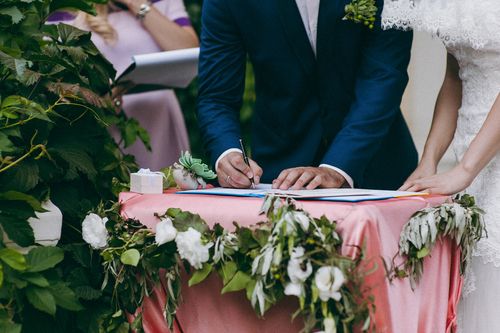 Wondering how to fill out a marriage license? Need to know what to do about an expired marriage license? Got other burning questions about this all-important document? We’ve got answers. This short FAQ includes important information about marriage licenses: the application process, waiting periods, and more.
Wondering how to fill out a marriage license? Need to know what to do about an expired marriage license? Got other burning questions about this all-important document? We’ve got answers. This short FAQ includes important information about marriage licenses: the application process, waiting periods, and more.
How can a couple apply for a marriage license?
Marriage license application procedures vary by jurisdiction. Many states and counties allow you to start the application online, but you’ll need to go to the appropriate government office to finish. Others do the whole marriage license process in person, but you may be able to download an application on their websites.
When you go to your clerk of courts or marriage bureau office, you should bring a photo ID plus any other required documents. If you’re divorced or widowed, you may be asked to bring proof — a divorce decree or a death certificate. Currently, no states or counties require blood tests to get a marriage license. Once the application is completed and you’ve paid the appropriate fees, you’ll be issued your license.
Are there waiting periods for licenses?
The waiting period for a marriage license is usually set at the state level. There are currently 14 states that have waiting periods, varying from 24 hours to five days. However, you should check with your clerk of courts or license bureau and verify how soon you can marry after getting your license. Delaware has no waiting period, for example, but you cannot hold your ceremony until 24 hours after your license has been issued.
What is a marriage certificate?
There is an important difference between a marriage license and certificate. It’s easy to confuse the two, but you can tell them apart by a few notable details. The license is the document you’re issued by your clerk or marriage bureau official. The completed license form is submitted back to its issuing office, which then grants you a marriage certificate. It usually takes about four weeks to get a certificate back, but turnaround times can vary by jurisdiction.
Who fills out the license?
On the day you get married, your marriage license should be completed with its required information. Usually, this includes your names, plus your birth cities and states. Most license forms also ask for the month, day, year, and time the ceremony took place. It may also ask for the address, city, and state where your marriage was solemnized.
Your state may require that witnesses be present at your marriage. If this is the case, your witnesses will need to provide their names and signatures. Your officiant should also sign the license plus fill in any other required details: full name, title, and ordaining body. Once the license form is complete, your officiant should submit it to the original issuing office.
What should a couple do if their license expires?
A marriage license is valid for a specific time period from its date of issue. This time length varies, depending on where the license was granted. For instance, Ohio marriage licenses are good for 60 days. Wisconsin’s are only good for 30 days, while Maine licenses expire 90 days after they’re granted. But those periods can be much longer: Arizona licenses are valid for up to 12 months. If you don’t make your jurisdiction’s deadline, you’ll have to apply for a new license.
Getting a marriage license seems like a complex process. After all, you’re asked for a lot of information and there are deadlines to meet. An organized approach can help you stay on task. Be sure to research your jurisdiction’s rules and keep important documents where you can easily access them. You can also check out Get Ordained’s guide to completing marriage licenses for more useful information.